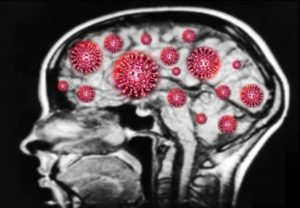COVID-19 is creating real fears about the many ways it can damage the brain.
When you think about COVID-19 you think severe respiratory issues, fever, and cough. But as the pandemic continues, it is increasingly clear that this particular coronavirus is affecting patients in diverse ways. The impact on the human body may be far wider than we originally thought. The main concern for researchers is the potential impact of this on the brain. These symptoms include confusion, stroke, inflammation of the brain, seizures, and paralysis. It isn’t unheard of for a viral infection to cause such effects on the brain, but the coronavirus seems to be causing more neurological disorders than other similar and widespread viruses.
There have been many personal accounts of people with COVID-19 who are baffled by their sudden and seemingly random neurological symptoms. Here are two examples:

- A 58-year-old airline worker had flu-like symptoms, then became completely disoriented and was unable to remember anything except her name.
- A woman in her mid-50s suddenly became confused and aggressive towards others, believing her husband was an imposter. She had no psychiatric history but did test positive for COVID-19.
Although there is no complete explanation for how this virus attacks the brain, various studies reported that people with COVID-19 had swelling and inflammation in their brain. This could be the cause of COVID-19 brain damage.
Benedict Michael, a neurologist at the University of Liverpool, UK studied neurological damage linked to Coronavirus. His team analyzed 125 people in the UK with COVID-19 who had neurological or psychiatric symptoms. From this group, 62% had experienced damage to the brain’s blood supply, such as strokes and hemorrhages, and 31% had altered mental states, such as confusion, psychosis, or unconsciousness. Some of the patients experiencing the worst neurological manifestations only had mild respiratory symptoms.
Clinicians don’t know how common these neurological effects are yet, but using the data from published studies suggests its prevalence may be between 20,000 and 50,000 people so far.
How Does COVID-19 Affect the Brain?
The most compelling question is how this virus can cause so many different brain symptoms including:
- Confusion/psychosis

- Loss of consciousness
- Seizures
- Stroke
- Loss of smell and taste
- Headaches
- Trouble focusing
- Changes in behavior
- Hallucinations
Based on the current research, there are 4 theories on how COVID-19 may harm the brain. Each needs continuous study before any serious conclusions can be made.
- Direct Brain Infection- The virus may have the capacity to enter the brain through the nose and cause severe and abrupt infection of brain cells. The virus may also enter the bloodstream and then reach the brain indirectly.
- Overworked Immune System – The virus may cause an exaggerated immune response. A “maladaptive” inflammatory reaction can kill brain cells and damage the brain.
- Blood-Clotting Issues- The hyperactive immune response can cause formation of blood clots. These blood clots cause a stroke when they block the arteries in the brain.
- Disarray in the Body- The effect of high fevers, low oxygen levels, and organ failure can cause brain dysfunction (including extreme confusion or coma).
We still do know why some people have neurological symptoms and others do not. In order to find answers on COVID-19 brain damage, we need more research and information, which will take some time.
In the meantime, it is important to stay safe and take steps to prevent the spread of COVID-19 by washing your hands, wearing a mask, and following other interventions outlined by the Centers for Disease Control.
If you are interested to learn how you can recover faster from neurological symptoms of Covid-19, you can check out our website: www.neurogrow.com
This blog was written by Emily Lipstein and edited by Dr. Fotuhi.